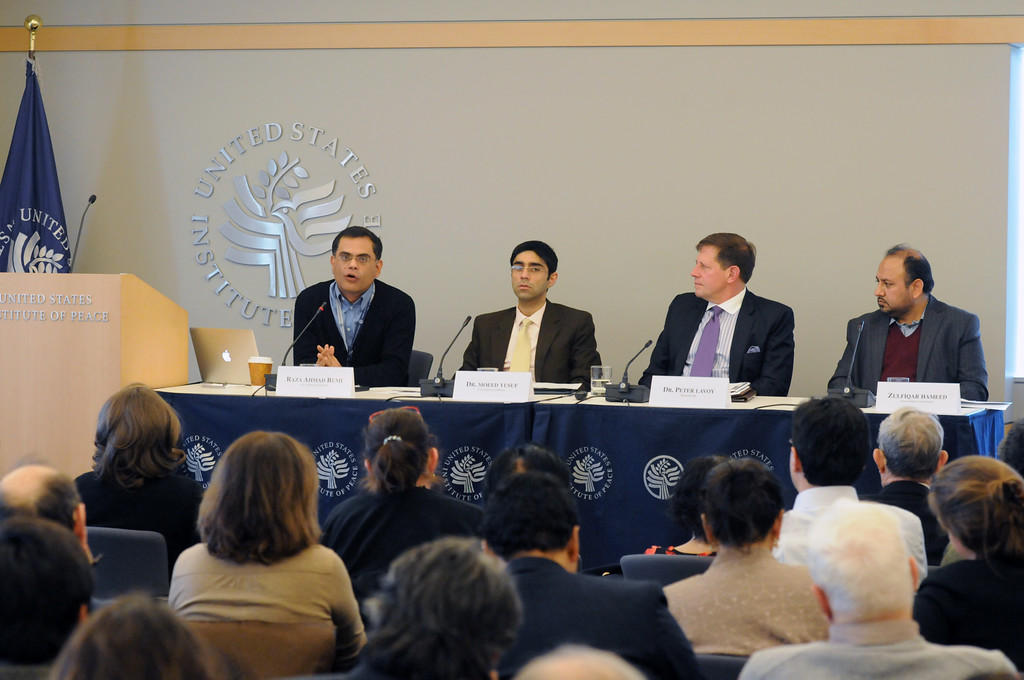Pakistan Massacre of Schoolchildren: What Has It Changed?
Will the December Attack in Peshawar Lead to a Fuller Counter-Terror Strategy?
Even having lost 50,000 people killed in terrorism-related violence over more than a decade, Pakistan was stunned by the Taliban massacre of 145 schoolchildren and others at an Army school in Peshawar on December 16, 2014. With some commentators calling the event “Pakistan’s September 11,” the U.S. Institute of Peace convened experts to assess whether the country may actually have reached a decision point that could yield a more consistent and effective state campaign against terrorism.

While the Peshawar attack spurred Pakistan’s often-divided civilian and military policymakers to vow concerted counter-terrorist action in a new “National Action Plan,” this “cannot succeed unless the jihad infrastructure” historically linked to Pakistan’s military “is … undone,” said Raza Rumi, the Pakistani policy scholar and writer now serving as a USIP senior expert.
Often less noted is that more than 110 government functions and a vast share of revenues have been transferred since 2010 from the national government to the provinces, Rumi noted, leaving Pakistan “no longer the kind of centralized state” it was even a decade ago. “A lot of de-radicalization measures, whether … the changing of narratives, improvement of education systems, police reform, local government reform, are purely provincial domains,” he said. The central government and military have not fully engaged these critical provincial authorities in shaping and implementing the new national security plan, he said.
Also, Rumi noted, the current campaign on terrorism is being driven by the armed forces, which attempted similar measures under Pakistan’s most recent military regime, of Gen. Pervez Musharraf. Because of the weakness of Pakistan’s institutions, that effort failed, and it is uncertain whether the current attempt will do better.
The surge in political rhetoric and lawmaking against terrorism—including revived capital punishments and a constitutional amendment that establishes military counter-terrorism tribunals for the next two years—will not fix the flaws of Pakistan’s inadequate justice system, said Zulfiqar Hameed, a senior Pakistani police official now with the New America Foundation. “The biggest merit of this whole approach is that it has a lot of signaling value” that could help in implementing further steps, Hameed told the audience of policy specialists, students and others. Eventually, Pakistan may need to consider judicial and police reforms similar to those used by Italy to weaken its Sicilian mafia in the 1980s and ‘90s.
Events such as the school massacre tend to drive wide swings in how Pakistan’s elite, English-language media advocate for policy, said Peter Lavoy, a Pakistan policy specialist and former deputy assistant secretary of defense. Lavoy, who has overseen a project to map Pakistan’s “public conversation” and its primary narratives, said that effort has yielded some insights, including signs that Pakistan’s elites have begun “looking inward” for the causes of Pakistan’s long seizure of jihadist and other militant violence.
Especially as the United States draws down its presence in neighboring Afghanistan, Pakistani elites are turning away from their long focus on U.S. and other external actors as likely causes of that violence—and increasingly demand “institutional reforms” to the police, courts and schools, he said. Still, the role of what Rumi referred to as Pakistan’s “jihadist infrastructure”—groups backed as anti-India proxy forces by parts of Pakistan’s security community—“barely registers” in public media and debate, Lavoy said.
James Rupert is an editor at USIP.



